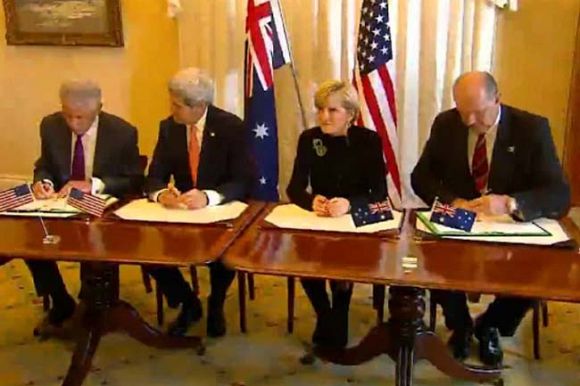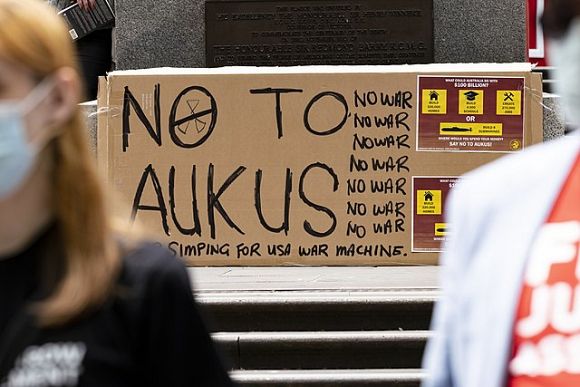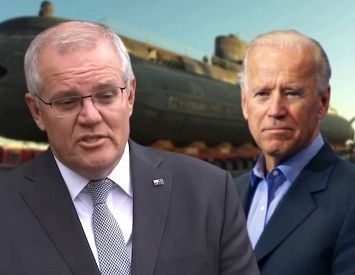Anxieties are growing in U.S. Congress over the ability to support the nuclear submarine deal as part of the AUKUS pact. Dr Binoy Kampmark reports.
THE POLICYMAKING apparatus behind the AUKUS security pact was shoddy from the start. It has raised questions about the extent U.S. power will subordinate Australia further in future conflicts; it has brought into question Australia’s own sovereignty; and it has also raised the spectre of regional nuclear proliferation via the use of otherwise closely guarded propulsion technology.
The other feature of this whole enterprise, as it always is regarding the procurement of submarines, is their rate of production. The U.S. Navy’s fast-attack submarine program, the Virginia-class, is under pressure. A mere 1.2 vessels have been delivered, on average, per year over the last five years.
The corollary of that problem is whether Australia would simply buy a U.S. nuclear-powered submarine, the classic off-the-shelf approach to defence procurement that thrills some while aggravating others. This, according to a number of voices in Congress, is a fanciful prospect to be stomped upon.
Representative Rob Wittman (R-Va) of the House Armed Services Committee’s seapower committee bluntly told Breaking Defense in December:
“That’s not going to happen. I just don’t see how we’re going to build a submarine and sell it to Australia during that time.”
Washington’s less-than-humble servant in Canberra, the Australian Strategic Policy Institute, echoes the line of their masters.
Marcus Hellyer confirms:
“The U.S. doesn’t have spare submarines it can sell to Australia and it won’t have them anytime soon.”
To give Australia submarines needed by the U.S. Navy “particularly when its own numbers are flatlining is just not an option that the U.S. political leadership will consider”.
The dreaded alternative is one that entails an Australian-built SSN, which sounds rather close to another white elephant candidate awaiting its spot in the museum of failed defence ventures. Wittman, still smelling a buck for U.S. national interests, suggested that Australian submariners or shipbuilders spend time in the U.S. “for a full build cycle” to understand the process.
The next Virginia-class submarine that is built could then be designated to the Australian area of responsibility (AOR) and be operated by a dual U.S.-Australian crew, with a dual command function.
Wittman says:
“So it’ll be a submarine that operates in their AOR like an Australian submarine.”
Wittman’s observations lit a fire of scepticism. In a letter of concern to U.S. President Joe Biden, Senators Jack Reed (D-RI) and James Inhofe (R-Okla) dated 21 December last year, the lawmakers are clear that ‘current conditions require a sober assessment of the facts to avoid stressing the U.S. submarine industrial base to the breaking point’.
It must come as something of a supreme irony that Congress is concerned that the U.S. will suffer its own challenges to sovereignty by committing Virginia-class vessels to Australia under the AUKUS agreement. This, from a country that has clearly, unequivocally and seamlessly taken control of Australian military and operational independence in any functional sense.
The letter states:
‘AUKUS options that would have the U.S. transfer or sell Virginia-class submarines prior to meeting [the Chief of Naval Operations] requirements would make the U.S. Navy less capable of meeting sovereign wartime and peacetime requirements.’
The lawmakers then go on to show that characteristic candour absent in Canberra’s provincial and ferociously reticent circles:
‘Make no mistake, we recognise the strategic value of having one of our closest allies operating a world-class nuclear navy could provide in managing long-term competition with an increasingly militaristic China.’
The Australian Government, taken aback by these rumbles, has released a number of statements that do little to scotch growing doubts.
Defence Minister Richard Marles ponders Australia’s own contribution to the agreement, believing it to be worthwhile and able:
“We have said we will build the capacity in Adelaide to build nuclear-powered submarines.”
Details as to how this will be done are woefully skimpy. It is simply not clear whether Marles has any concept about the complexity of the project, observing that nuclear technology experts from universities across the country will be co-opted as part of the enterprise. “This is a really exciting opportunity for Australia.” He will have to do somewhat better than that to convince the likes of Reed and Inhofe.
The result of such concerns has turned Australian Prime Minister Anthony Albanese into an energetic lobbyist deserving a corner office on The Hill.
One report from The Australian noted how he was
‘...lobbying members of U.S. congress to hold the line in supporting the AUKUS nuclear submarine deal as it comes under criticism in America, calling the pact essential in strengthening Australia’s defence capabilities.’
His statements of late, despite their bold confidence, do little to suggest that the nuclear submarine idea is not sinking:
“We’re very confident that it’s in the interests of Australia, but also in the interest of the United States and the interests of the United Kingdom.”
He has spoken about the “optimal pathway”, which was “not just the issue of what is built, but how it is built, as well as the optimal pathway in building a capacity of skills in the Australian workforce”.
Such statements do little to arrest the hard-nosed sceptics in Congress, who see little merit in splashing out in such endeavours if there is no safe, assured return for U.S. military and business interests. The issue of improving Australian skills in the area is a distant, secondary consideration. It seems that the nuclear submarine aspect of AUKUS may sink before it gets off the assembly line.
Dr Binoy Kampmark was a Cambridge Scholar and is a lecturer at RMIT University. You can follow Dr Kampmark on Twitter @BKampmark.
Related Articles
- U.S. military agreement setting Australia up as launching pad for war
- Media's uncritical acceptance of AUKUS damaging to Australia
- Anti-AUKUS campaign ramps up over U.S.-China war talk
- AUKUS: The militarisation of Australia
- Morrison's Australia remains servile under AUKUS agreement
 This work is licensed under a Creative Commons Attribution-NonCommercial-NoDerivs 3.0 Australia License
This work is licensed under a Creative Commons Attribution-NonCommercial-NoDerivs 3.0 Australia License
Support independent journalism Subscribe to IA.















